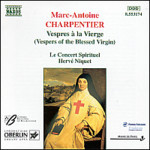
Charpentier: Sacred Choral Works Vol. 2: Vespres a la Vierge (Vespers of the Blessed Virgin)
 $25.00
Low Stock
add to cart
$25.00
Low Stock
add to cart
MARC-ANTOINE CHARPENTIER
Charpentier: Sacred Choral Works Vol. 2: Vespres a la Vierge (Vespers of the Blessed Virgin)
Le Concert Spirituel, Herve Niquet (conductor)
[ Naxos / CD ]
Release Date: Saturday 29 October 2005
Should this item be out of stock at the time of your order, we would expect to be able to supply it to you within 2 - 5 business days.
Marc-Antoine Charpentier was a leading contemporary of Lully. His exact date of birth can only be conjectured, but he studied in Rome with Carissimi, from whom he acquired a knowledge of contemporary Italian styles. Soon after his return, he seems to have entered the service of the Duchesse de Guise, Marie de Lorraine, later assuming the position of her maître de musique, which he held until her death in 1688. He collaborated with Molière, who had formerly worked with Lully, providing music for, among other plays, Le malade imaginaire, and with other playwrights of the Comédie Française. Relative brief association with the court came in work for the Dauphin and a consequent royal pension, but more important was his employment at the Jesuit Church of St Louis, known to contemporaries as l'église de l'opéra. From 1698 until his death in 1704 he was maître de musique of the Sainte-Chapelle. He left a very large quantity of church music, Mass settings, sequences, antiphons, settings of the Tenebrae lessons and responsories, canticle and psalm settings, motets for the elevation and dramatic motets, with a smaller but not insignificant quantity of instrumental and secular music.
"Performances sound splendid to me...Another one to add to the buying list."
- Classic CD - February 1996
"Performances sound splendid to me.... Another one to add to the buying list"
- Classic CD 5
"This release offers a liturgical reconstruction of the Vespers office. The five Vesper psalms and Magnificat belong to different periods in Charpentier's life and the six antiphons are by his organist-composer contemporary, Nivers. The reconstruction works well and Le Concert Spirituel, under Hervé Niquet, demonstrates its rapport with Charpentier's music. The vocal sound is fresh and the wide range of musical Affekt shows off a greater diversity of tonal colour.
Tenors and basses incline towards a roughness of timbre here and there yet, overall, the bright and full-blooded choral sound is pleasing and vital. Some may find the recording balance of the psalms and canticle a fraction too close, creating the atmosphere of a drawing-room Vespers rather than one in more spacious, ecclesiastical surroundings. The antiphons fare much better in this respect, having a deeper aural perspective.
This is a richly rewarding programme of music which never disappoints." Gramophone Classical Music Guide, 2010

